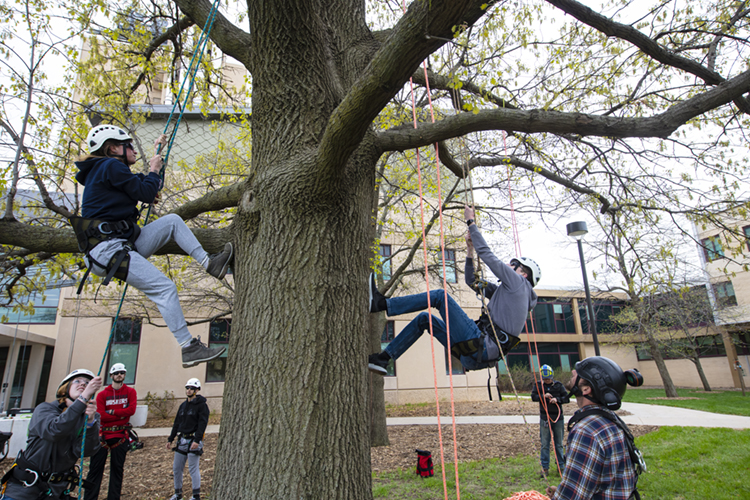
Students at the University of Nebraska-Lincoln can now minor in urban forestry, a career field quickly growing as environmental issues such as the encroaching emerald ash borer and climate change increasingly threaten trees in our communities.
The program, developed by Eric North, an assistant professor of practice with the School of Natural Resources, teaches students to care for and manage trees in rural and urban communities. Students learn the basics of tree biology, but also how to complete site assessments, manage pests and think strategically about urban forest management — to the benefit of both humans and the environment.
“Students earning this minor can pursue careers in urban and rural forestry, arboriculture, natural resources management and green infrastructure,” North said, “or they can use it to complement another degree in natural resources, horticulture, or even landscape architecture.” Students pursing the environmental restoration degree, for example, can turn to trees to improve water quality.
Students can declare the urban forestry minor by visiting the CASNR Dean’s office, 103 Agriculture Hall, East Campus, to fill out the necessary paperwork for their degree audit.
To earn the minor, students are required to take dendrology or landscape plants; tree biology; arboriculture; and greenspace and urban forestry management; and one of these four elective courses: environmental communication skills; introduction to GIS; the community and the future; or introduction to planning. Learn more about the courses here.
In pursuit of the minor, students also will gain hands-on resume-building experience, including tree climbing, pruning and measuring trees, and also how to write city-planning guides, with an emphasis on tree maintenance, health and diversity.
The minor also emphasizes the importance of experiential learning through internships sought with state and federal agencies or private businesses.
“The urban forestry minor is unique in its blend of science theory and hands-on learning opportunities,” North said. “As the home of Arbor Day and the Arbor Day Foundation, Nebraska is a great place to develop a program to continue to spread the love and understanding to the importance of trees and create a new generation of Tree Huskers.
“We don’t just teach how trees work: Students are out looking at and working with trees and talking with professionals about realities of working in rural and urban forests – the blended classroom and real-world opportunities is what will give students a competitive edge.”
The minor is the precursor to an expected major in regional and community forestry, still in the approval process by the University of Nebraska, and expected to be approved in 2020.
Both have been developed in partnership with the Department of Agronomy and Horticulture and the Landscape Architecture Program at Nebraska, with input from the industry and support from the Nebraska Forest Service and the U.S. Forest Service.
“Trees are awe-inspiring, living sometimes thousands of years and growing hundreds of feet in the air, all the while quietly recording the passage of time and events in the rings of their trunks,” North said. “I have no doubt that Nebraska’s Tree Husker graduates will have the same lasting impacts in the world.”
Shawna Richter-Ryerson, Natural Resources
More details at: http://snr.unl.edu/undergrad/majors/reg_comm_forest/